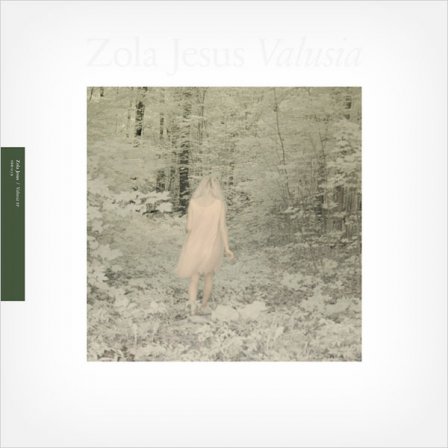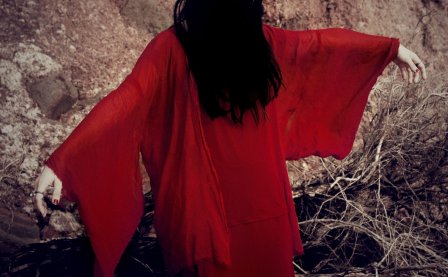Nika Roza Danilova, a.k.a. Zola Jesus, has shed much of the distortion and metallic textural meanderings that wreathed her 2009 full-length The Spoils. While her industrial and avant-pop-noise influences presided there — Throbbing Gristle, Coil, even The Residents — the Stridulum EP heard her soaring, strong operatic voice brought further to the fore. Danilova’s latest continues to move in this direction, polishing up the scoured sonic spaces of the cold Wisconsin rustbelt to present lusher, but no less cold, pastures.
What has been mapped out is by no means pastoral. Not at all. Imagine, rather, an isolated cavern set into a bluff overlooking such a prospect: a landscape green but still toxic, invisible, in hibernation, fringed by the cities of “synthesized stimulation” of the literally post-industrial Wisconsin rustbelt that Danilova refers to in interviews.
Continuing this opening up, as if Danilova and her music were emerging from wintering under a blanket of noise, Valusia’s vocals and often non-synthesized orchestrations (Cult of Youth’s Christiana Key’s violin on “Poor Animal” and a real-life piano on “Lightstick”) are forward and immediate. Despite her extra-emphatic vocal presence, she remains committed to bedding her tracks in drum machines and synth, be it the enveloped whispers of white noise and martial drum programs of the opener, or the Faith-era Cure string patches that underpin the memorable, dare I say anthemic, album favorite “Sea Talk.” It would be trite to say that the difference between the frank humanity of her voice and the insistent electronic pulses and washes expresses some kind of contradiction or accord between the organic and inorganic, but say it I must, because on that level Valusia works to broach this — characteristically apocalyptic — possibility.
In a sense, this is old hat. Valusia is early-4AD terrain. To criticize Zola Jesus in this way is by now old hat, too, but it’s unavoidable. In Zola Jesus, one hears The Cocteau Twins, the twin-barrels of elegantly electronic-augmented instrumentation and an absolutely singular voice. However, while Danilova certainly possesses a vocal grandiosity that recalls Dead Can Dance’s Lisa Gerrard and that band’s doom-and-hope sensibility, the lilt and glossolalia of the Cocteau Twins’ Liz Fraser is replaced with stridency and directness of lyrical expression; Dead Can Dance’s varied palette finally passed over in favor of a more consistent — or one-dimensional — eyes-heavenward attitude and musical scope.
Most divisive is surely Danilova’s voice, and detractors will cite this, the overarching bleeding-heart feel of Valusia, and other releases as evidence of histrionic excess. But surely even the most skeptical will acknowledge her as a figure of rare substance: as a contemporary surfacing of the buried and oft-abused vein of Gothic music, she is capable of sincerity, fragility, and sheer self-assuredness while just managing to avoid the criminal offense of self-conscious posture. It is clear that Zola Jesus’ evident talent is seeking out its maturity, something that this reviewer hopes that a full-length born of Valusia will demonstrate.
More about: Zola Jesus




